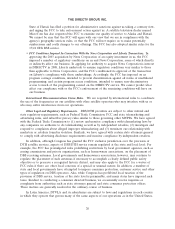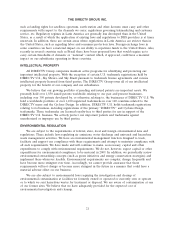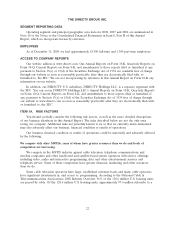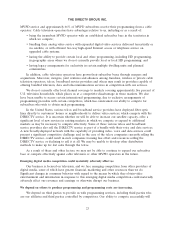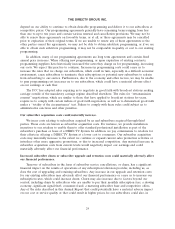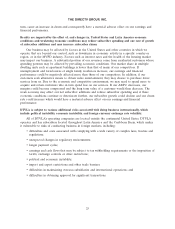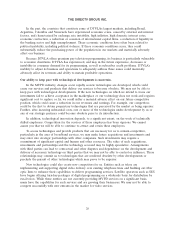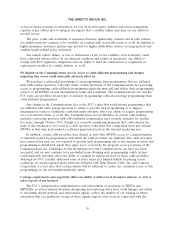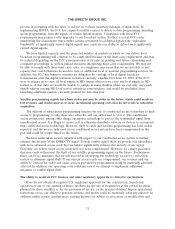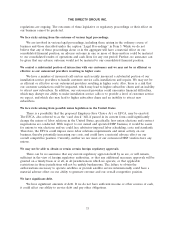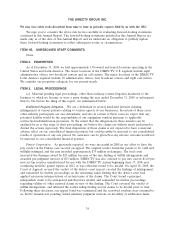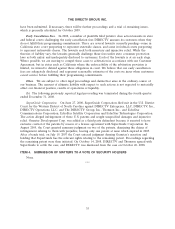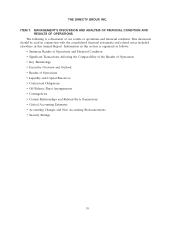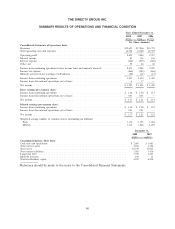DIRECTV 2008 Annual Report Download - page 43
Download and view the complete annual report
Please find page 43 of the 2008 DIRECTV annual report below. You can navigate through the pages in the report by either clicking on the pages listed below, or by using the keyword search tool below to find specific information within the annual report.THE DIRECTV GROUP, INC.
or loss of future revenues or subscribers, we rely on in-orbit spare satellites and excess transponder
capacity at key orbital slots to mitigate the impact that a satellite failure may have on our ability to
provide service.
The price, terms and availability of insurance fluctuate significantly. Launch and in-orbit policies
on satellites may not continue to be available on commercially reasonable terms or at all. In addition to
higher premiums, insurance policies may provide for higher deductibles, shorter coverage periods and
satellite health-related policy exclusions.
Any launch vehicle failure, or loss or destruction of any of our satellites, even if insured, could
have a material adverse effect on our financial condition and results of operations, our ability to
comply with FCC regulatory obligations and our ability to fund the construction or acquisition of
replacement satellites in a timely fashion, or at all.
We depend on the Communications Act for access to cable-affiliated programming and changes
impacting that access could materially adversely affect us.
We purchase a substantial percentage of our programming from programmers that are affiliated
with cable system operators. Currently, under certain provisions of the Communications Act governing
access to programming, cable-affiliated programmers generally must sell and deliver their programming
services to all MVPDs on non-discriminatory terms and conditions. The Communications Act and the
FCC rules also prohibit certain types of exclusive programming contracts involving programming from
cable-affiliated programmers.
Any change in the Communications Act or the FCC’s rules that would permit programmers that
are affiliated with cable system operators to refuse to provide such programming or to impose
discriminatory terms or conditions could materially adversely affect our ability to acquire programming
on a cost-effective basis, or at all. The Communications Act prohibitions on certain cable industry
exclusive contracting practices with cable-affiliated programmers were recently extended for another
five years, through October 2012, though it is currently considering proposals that could shorten the
term of this extension to two years if a cable operator could show that competition from new entrant
MVPDs at that time had reached a sufficient penetration level in the relevant marketing area.
In addition, certain cable providers have denied us and other MVPDs access to a limited number
of channels created by programmers with which the cable providers are affiliated. The cable providers
have asserted that they are not required to provide such programming due to the manner in which that
programming is distributed, which they argue is not covered by the program access provisions of the
Communications Act. Challenges to this interpretation of the Communications Act have not been
successful, and we may continue to be precluded from obtaining such programming, which in turn
could materially adversely affect our ability to compete in regions serviced by those cable providers.
Although the FCC recently addressed some of these issues in a limited fashion by placing access
conditions on certain regional sports networks affiliated with Time Warner Cable, Inc. and Comcast
Corporation, it is not clear that such provisions will be sufficient to assure our continued access to this
programming on fair and nondiscriminatory terms.
Carriage requirements may negatively affect our ability to deliver local broadcast stations, as well as
other aspects of our business.
The FCC’s interpretation, implementation and enforcement of provisions of SHVIA and
SHVERA, as well as judicial decisions interpreting and enforcing these laws, could hamper our ability
to retransmit distant network and superstation signals, reduce the number of our existing or future
subscribers that can qualify for receipt of these signals, impose costs on us in connection with the
30


